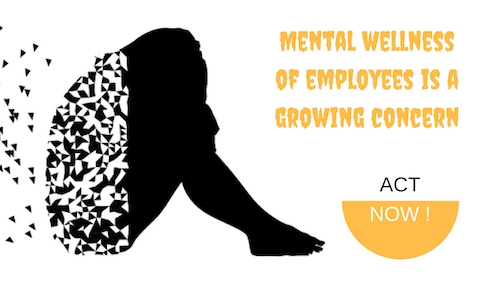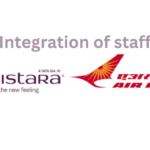Tracking mental wellbeing may be seen as invasion of personal space, making employees feel targeted. The key lies in raising awareness about depression through webinars and other forums.
Why does Deepika Padukone openly share her thoughts on ‘depression and stress’ on Instagram? Simply because it needs to be discussed! Early this year, one of her Instagram posts read, “Depression today is a growing epidemic. Yet, there is so much stigma attached to it that individuals are often dissuaded from seeking help.”
The problem with depression is not the illness itself, but the fact that most people shy away from accepting it or even discussing it. When it comes to the workplace, people try to wear a mask and stay professional despite being stressed. This makes it difficult to identify someone who may be depressed until the state of mind takes an extreme form. Too many breaks, frequent leaves, mood swings, lack of engagement and deteriorating performance should raise red flags for any manager or team lead. Some of these signs are possibly hints of depression.
Around 57 million people in India are affected by depression, which is 18 per cent of the total number of people who suffer from the condition globally, as per a WHO report last year. According to 2018 Cigna 360° Well-being Survey, 89 per cent of the Indian population is suffering from stress compared to the global average of 86 per cent.
Stress that goes untreated can lead to depression and hamper an employee’s health and career. But do organisations take note? Most leaders acknowledge the importance of mental wellness, but only a few companies are actually doing enough to address the issue on ground.
Not only is there little understanding about mental health issues (MHIs) including depression, even companies fairly aware choose not to openly address them.
It’s high time employees are encouraged to take up an enriching and healthy lifestyle. Take the right step forward with Vantage Fit – a customizable health and wellness application built specially for corporate employees.
“In the West, depression is considered as any other disability and companies accommodate such employees reasonably well. It is a fact that mental illness is not even recognised as an illness in India yet. Companies are wary of employees who discuss depression. Mostly such employees get exploited by being categorised as non-performers, and ultimately sacked. On the other hand, it doesn’t take much for individuals to declare themselves depressed and enjoy the benefits of the policies, either,” said Jayanthi Gopal, former VP & country head-HR, State Street Private India.

Stress is a big problem in organisations today and depression is not easily identified. We have proactive policies that offer space for the psychological well-being of employees.
Most leaders believe it is not possible to track mental well-being because of confidentiality issues. Employees may feel targeted, which will increase the stigma and defeat the very purpose of the exercise.
“It’s important for organisations to create a culture that is sensitive to the problem of depression, and to not confuse mental-health issues with disciplinary or behavioural issues,” says Dr Shyam Bhat, psychiatrist and mental-wellness expert.
Employees hesitate to discuss depression with co-workers for fear of being judged. Organisations should make efforts to increase awareness about mental health and normalise the idea that mental health is no different from physical health.
“It is good to have an open dialogue with the employees and their families and offer help in the form of rest, leave, sabbatical, medical assistance and support. If a very stressful situation at work is the cause for such illness, the employee can be moved to another department or role which is less stressful,” says Rajorshi Ganguli, president & global HR head, Alkem Laboratories.

It is good to have an open dialogue with the employees and their families and offer help in the form of rest, leave, sabbatical, medical assistance and support. If a very stressful situation at work is the cause for such illness, the employee can be moved to another department or role which is less stressful.
Fortunately, a few companies now realise that taking care of their employees’ emotional health helps them as well as the organisation’s bottom line.
Corporates are taking proactive measures to raise awareness about mental wellness through forums. They are creating avenues where employees are encouraged to share experiences, and where depression is not perceived as a personal weakness.
Several organisations provide professional help in the form of internal counsellors, doctors and even formal external employee assistance programmes (EAP), to help such employees.
Mahindra & Mahindra has the ‘M-Happy’ initiative, through which employers can connect with an NGO that offers consultation by psychologists and counsellors. The Company’s medical policy also covers expenses pertaining to mental illness.
It organises mindfulness sessions with employees, in addition to providing 14 days of compulsory leave, which employees can take to rejuvenate. “Stress is a big problem in organisations today and depression is not easily identified. We have proactive policies that offer space for the psychological well-being of employees,” says Prince Augustin, EVP – group human capital & leadership development, Mahindra & Mahindra.
Some companies also organise mood-elevator sessions through webinars. The sessions help gauge the mood levels of employees. For instance, ‘on top of the mood’ employees will be wise, optimistic, passionate, compassionate and creative, while those on the other extreme, will be frustrated, judgemental, irritated, defensive or anxious. The employees seen ‘below curious’ levels are advised to take a break.

Companies are wary of employees who discuss depression. Mostly such employees get exploited by being categorised as non-performers, and ultimately sacked. On the other hand, it doesn’t take much for individuals to declare themselves depressed and enjoy the benefits of the policies, either.
Cigna TTK Health Insurance also had an employee assistance programme, which was discontinued after two years as there was no uptake. “We are focusing on stress management, where preventive measures are taken to deal with stress in employees before it reaches the stage of depression,” says Reena Tyagi, head-HR, Cigna TTK Health Insurance.
Depression creeps in slowly, and the symptoms aren’t easy to gauge, which is why it tends to go unnoticed. Therefore, prevention is better than cure. Organisations can do a lot proactively to provide a conducive work environment, and create awareness around mental wellness, so that people don’t hesitate to talk about it. Companies need to tackle depression by nipping it in the bud, to ensure the overall wellbeing of its present and future workforce.
Value our content... contribute towards our growth. Even a small contribution a month would be of great help for us.
Since eight years, we have been serving the industry through daily news and stories. Our content is free for all and we plan to keep it that way.
Support HRKatha. Pay Here (All it takes is a minute)




































